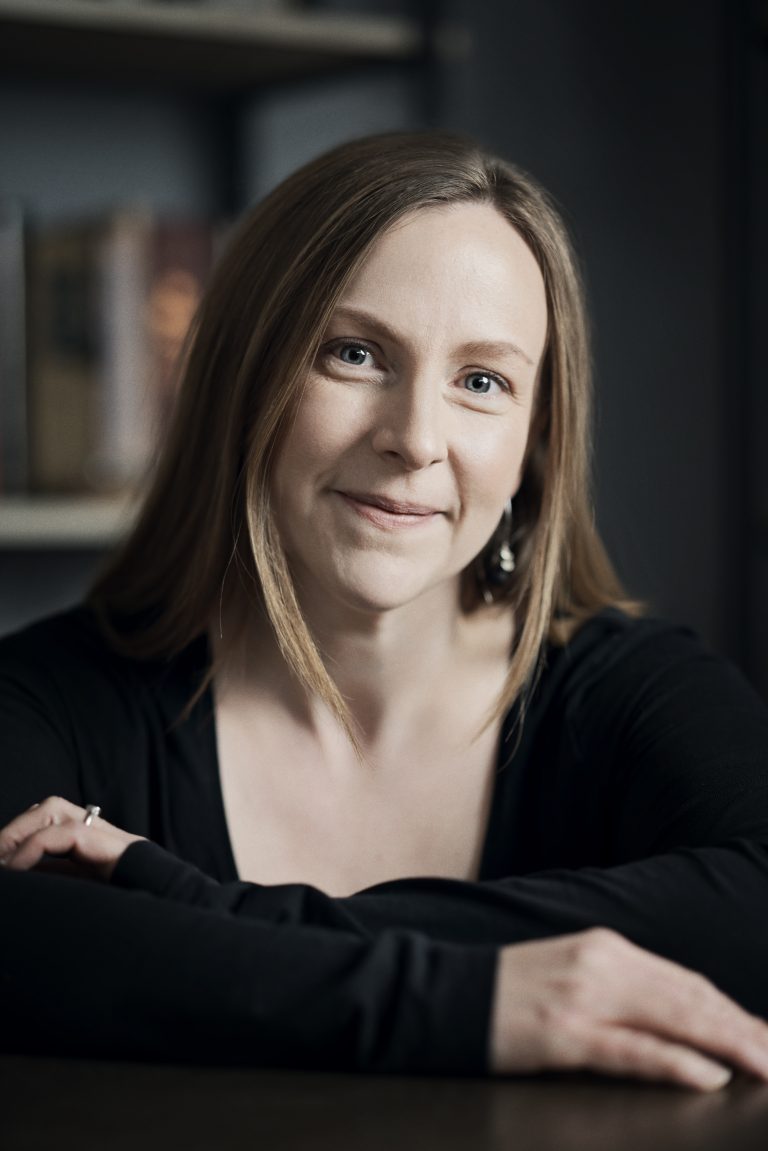“Chance Me,” by Caitlin Horrocks
Fiction faculty member Caitlin Horrocks was recently featured in Electric Literature. Read an excerpt of “Chance Me” below:

Chance Me
“Just,” his son corrected him at the airport. “Just ‘Just.’ ”
Bond, James Bond, Harry thought. Like they were starring in a rip-off action flick and not the road-trip buddy comedy he’d been hoping for. “Harry, Harry Krier,” he said, holding out his palm for an ironic handshake.
“I know,” Just said, horrified. “I know your name.”
“I know! I know you know. It was a joke.” Harry had insisted on meeting his son at baggage claim rather than at the curb outside, but now he was dismayed at all the witnesses. Also, Just didn’t have any luggage. Only a ratty backpack slung over one shoulder. Harry went in for a hug instead of the handshake. Just raised his arms, awkwardly returning the embrace, and Harry caught a whiff of body odor. His son had grown tall enough that Harry’s nose was armpit height. Willow had been tall, Harry remembered. Willow had been an Amazon. Maybe she still was.
After fifteen years without seeing Just, Harry had steeled himself for almost any physical manifestation of his son, for Just to look exactly like his mother, Willow, or exactly like Harry himself. He was ready to be bludgeoned with memory, or guilt, or joy. But Just was a nearly blank slate — brown hair and eyes, a body that gave no hint of what its occupant used it for, no swimmer’s shoulders or runner’s wiriness. Jeans and sneakers and a plain black T-shirt. Such an ordinary boy, Harry thought, and the words seemed heartless, but not the emotion. Whole and healthy and ordinary. He could deserve no better fortune. He didn’t even deserve that.
“Sorry,” Just said, breaking the hug. “I probably need to shower.”
“You’re fine,” Harry said. “You’re perfect.”
Commentary on the flight (okay), the autumn weather (chilly, gray), and the traffic (heavy) got them out of Logan and onto I-90 heading toward Brookline.
“There are a lot of Dunkin’ Donuts here,” Just observed, looking out the car window.
“Do you want to stop for anything?” “No. I was just saying. There’s a lot.”
“I thought we’d have dinner at home, if that’s okay.
Miriam’s picking something up.”
“That’s fine,” Just said, and he asked Harry how he and Miriam had met.
“I sold her a condo.” After closing, they’d gone out for a celebratory drink. Six months later he’d moved into the condo with her. There was no stipulation against this in the National Association of Realtors bylaws. Second marriage for her. First for him, technically.
“Do I want to know what technically means?” Miriam had asked.
“I was very young,” he’d said, and the truth of this had hit him with unexpected force — a load of bricks, a piano out a window. He’d been very young when he was living in Arcosanti with Willow, and he wasn’t any longer, and he never would be again. Wherever else his life might take him, it would not take him back there, to the red desert hills and the bleached sheet of sky snapped open every morning above them, their baby squalling in a hand-painted card-board box. Now that baby was sitting in his Lexus, six feet tall and applying to Harvard.
On the phone, Willow had rattled off names like she was reading an online list of Boston-area colleges, not just Harvard, MIT, Tufts, but the off-brand schools out-of-staters never applied to, like Lesley, Suffolk, Simmons. “I thought Simmons was a girls’ school,” Harry had said. “I mean, women’s. A women’s college.” Was his son transgender and no one had bothered to mention it to him?
“He’s still narrowing down the list,” Willow had said. “There’s a school counselor who helps.”
Harry hadn’t realized that tiny Jerome, Arizona, even had a high school. After Arcosanti, Willow had ended up in a mining town turned vertiginous ghost town turned artist colony / tourist trap. She’d bought a house and a metalworking studio for almost nothing because it was at geologic risk of sliding off the mountain. Uninsurable, but she hadn’t cared. She’d sent photographs of Just posed with the lawn ornaments she made and sold; birdhouses on sticks were popular.
“He buses to Cottonwood,” Willow said, like she could hear what Harry was thinking. “It’s a good school. Pretty good, I guess.”
“It’ll have to be if he’s applying to Harvard,” Harry said, pointlessly.
“Look, everyone understands how competitive it is. Can he stay with you or not?”
Harry hadn’t wanted the conversation to go this way. He felt like no conversation he’d ever had with Willow had gone the way he’d meant it to. “Of course he can stay.”
“He just needs a place to sleep. He can get himself to the campus visits on the subway. Right? I think that’s right.” Her voice was suddenly uncertain.
She’d never lived in a town with more than five hundred people, he remembered. Neither had their son. “I’ll show him around,” Harry said. “I’ll take time off work.” “You don’t have to.” Willow never told him he had to do anything. She hadn’t made him the bad guy. He was the no- guy. Not the villain, just written out of the script entirely, and he’d let her do it. Miriam had rented that movie with Daniel Day-Lewis, the one where his character screams, “I abandoned my child! I abandoned my boy!” At least that guy abandoned the little deaf boy to become an oil baron, Harry thought. I abandoned my boy to become a real estate agent. The saddest movie never made. Or maybe it was a road-trip buddy movie after all, now that Just was finally here, and the real movie of Harry’s life had simply had a very, very long setup.
Read the story in its entirety here: https://electricliterature.com/chance-me-by-caitlin-horrocks/



